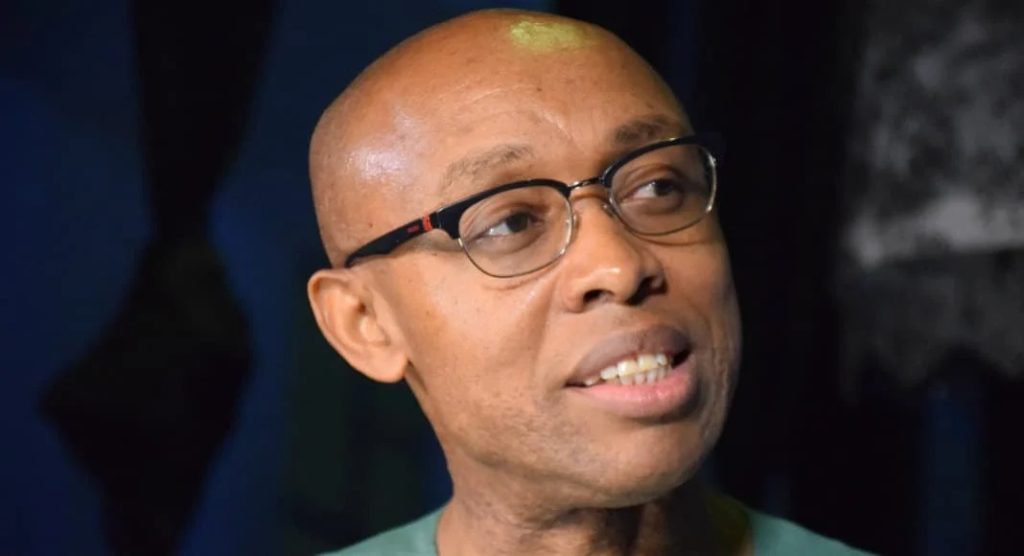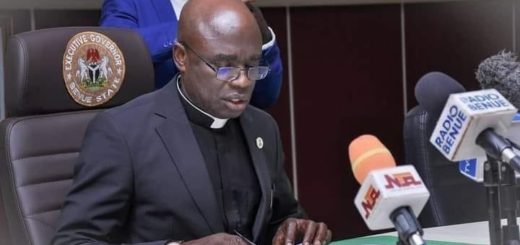In The Matter Of Dele Farotimi Before The Star Chamber by Prof Chidi Odinkalu
Paul Anyebe was a judge of the High Court of Benue State in north-central Nigeria who had a young son with sticky fingers and a sense of adventure It was his role as a dad that endangered his job as a judge.
One night around 1983, Anyebe caught his son attempting to steal from his bedroom. In response, Anyebe pulled his gun in an effort to scare the boy. The gun went off, discharging a bullet which hit and seriously injured the boy. The Attorney-General of Benue State decided to prosecute Paul Anyebe for attempted murder. The Penal Code applicable in Benue State at the time had ample provisions for the crime of attempted murder.
The Attorney-General also added a charge of illegal possession of firearms, a federal offence. Unlike the crime of attempted murder, which was a state crime in Benue State, all firearms offences are federal. The Attorney-General of Benue was well within his powers to prosecute for attempted murder but only the Attorney-General of the Federation could prosecute or authorize prosecution for federal offences.
At the conclusion of the trial, the High Court of Benue State discharged Paul Anyebe on the charge of attempted murder, a state offence, but convicted him on the charge of illegal possession of firearms (a federal offence)for which it sentenced him to three years in prison. The Court of Appeal reduced this sentence to six months in prison or a fine of one hundred Naira. Following this decision and while his appeal was yet to be heard by the Supreme Court, Paul Anyebe was dismissed as a judge.
When the Supreme Court decided Anyebe’s appeal in January 1986, Dahunsi Olugbemi Coker, a Justice of the court, summed up the issue for decision in one sentence: “The short point is whether a State Attorney-General can prosecute an offence created by an Act of the National Assembly.” To this question, the court unanimously responded in the negative. They nullified Anyebe’s trial and ordered the fine paid – one hundred Naira – refunded to him. The Court of Appeal ordered his reinstatement with full benefits.
Adolphus Godwin Karibi-Whyte, one of the justices who decided Anyebe’s appeal at the Supreme Court, said of what the case decided that ”the Attorney-General of a State has no general authority to exercise the powers of the Attorney-General of the Federation to prosecute in respect of Federal offences.”
One effect of this decision is to preclude the prosecution of federal crimes before state courts. A Magistrates Court is a state court. It does not have jurisdiction over federal crimes.
38 years after the Supreme Court of Nigeria established this principle in Anyebe’s case, the Nigeria Police Force (NPF) on 4 December arraigned lawyer and writer, Dele Farotimi, before a Magistrate in Ekiti State on 16 counts of crimes under the Criminal Code Act, a federal legislation.
Three years ago, Ekiti State enacted into law the Criminal Law of Ekiti State, no. 12 of 2021, which repealed and replaced the state’s pre-existing Criminal Code Law of 2012. Comprising nine parts, 429 sections and 140 pages, Ekiti State’s Criminal Law of 2021 does not include the crime Criminal libel or defamation. Section 70 of the law contains a crime of causing disaffection or breach of the peace through offensive publication but that is a simple offence punishable by six months in prison. It is not in issue in this case.
Last week, on 3 December, operatives of the NPF heisted Dele Farotimi from his residence in Lagos State, where the crime of criminal defamation is similarly unknown to law. They raced him across state lines to Ekiti where they detained him. The following morning, on 4 December, the police arraigned Dele before a Magistrate in the state capital.
This is important because the gist of the charges purportedly preferred against Dele Farotimi before the Magistrate in Ekiti is precisely criminal defamation which is not a crime in Ekiti State.
It seemed quite clear that the charges presented by the police did not disclose a crime known to the laws of Ekiti State nor did they disclose a crime over which a Magistrate in Ekiti State could purport to exercise lawful jurisdiction. Despite the evident absence of jurisdiction on multiple fronts, the Magistrate proceeded with undue haste to order the remand of Dele Farotimi in prison custody for one week until 10 December. The Magistrate probably did not realise that 10 December is International Human Rights Day.
Even if the Magistrate had jurisdiction, which he did not, the crime alleged was punishable with two years in prison. Under section 4(5) of the Criminal Law of Ekiti State, this is classed as a “misdemeanor” at best, that is to say “an offence punishable by imprisonment for not less than six months, but less than three years.” These are bailable on liberal terms. Offences punishable by more than three years in prison are called “felonies”. Those are regarded as serious offences. The order of remand in this case seemed wilful with a whiff of the pre-determined about it.
The United Nations Declaration of Basic Principles of Justice for Victims of Crime and Abuse of Power has a name for what happens when a court orders prison remand for a crime which does not exist in law and in proceedings over which it lacks powers. It is called “criminal abuse of power.”
Many people claiming to be senior lawyers have invited Dele Farotimi to have his day in court where he can prove the allegations the subject of these charges or face the consequences. This is clearly designed to make all this seem like an invocation of law. It isn’t.
First, Dele Farotimi can only do so before a court of competent jurisdiction. A Magistrate claiming to sit over a crime that does not exist in the state is not such a court.
Second, the burden in criminal proceedings is on the state to prove that the accused guilty. So, criminal proceedings in Ekiti or anywhere cannot possibly be the forum for Dele Farotimi to prove the truth of his claims. Anyone who makes that assertion is either wilfully jejune or must concede that the only opportunity to put that to test has to be in civil proceedings.
Third, insisting on the kind of proceedings now going on in Ekiti state without any sense of irony only reinforces the kinds of claims that Dele Farotimi makes in his best-selling book about supposedly legal and judicial processes which seem to occur in the pockets of human principalities given to playing god. A lot of things may yet happen in those kinds of proceedings but it does not look like law will be one of them.
Moreover, in 2021, the Supreme Court of Nigeria – no less – condemned as “vexatious and oppressive” and “dangerously rampant”, the “misuse of the criminal law machinery for getting reliefs in disputes that are civil in nature, by using the instruments of State.” The court also required that “a complainant who initiates a prosecution with the knowledge that criminal proceedings are unwarranted and the remedy lies in the civil law, should be made accountable in law for pursuing misconceived criminal proceedings.”
In that same case in 2021, the Supreme Court described the crime of criminal defamation as “an innovation in Star Chamber”, a reference to a notoriously arbitrary and captured judicial forum dating back to late mediaeval England. It was not a judicial endearment.
Dele Farotimi himself was perspicacious about the events as they have so far unfolded. Shortly before he was taken from Lagos, he warned: “abducting me to be tried in Ekiti State is not justice but a witch-hunt.”
Somewhere in Ekiti State on International Human Rights Day 2024, the very rights consecrated by the Universal Declaration of Human Rights will face the Guillotine with Dele Farotimi strung up as the sacrifice. Those who think this vindication may yet live to rue their affliction with terminal hubris.
A lawyer and a teacher, Odinkalu can be reached at chidi.odinkalu@tufts.edu














